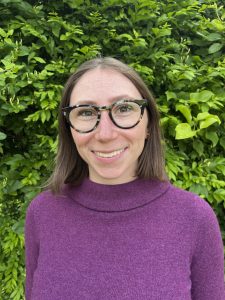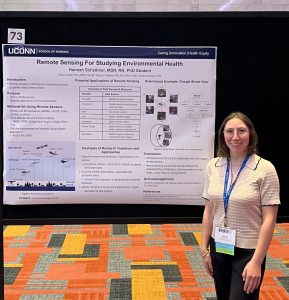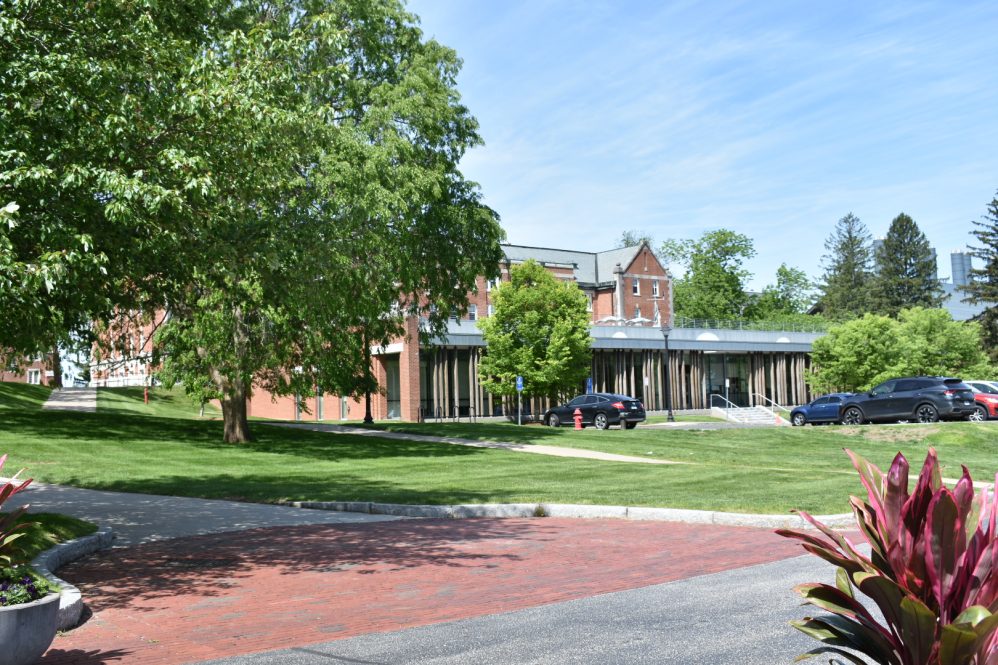Fourth year Ph.D. candidate Hannah Scheibner, MSN, RN, was first exposed to healthcare in high school as a volunteer emergency medical technician (EMT). With the high-stakes environment and hands-on experience she gained with patients, she knew nursing was her calling.
“I really liked interacting with people and being able to help them during a time of need,” said Scheibner. “That’s what led me into nursing.”

She completed her undergraduate degree in nursing at the University of Vermont and worked in primary care right after graduation. She worked as a telephone triage nurse – answering calls from patients, evaluating the patient’s information, and recommending the care they need, all via phone or video.
While she enjoyed what she was doing, she knew she could be doing more.
“I thought I wanted to be a nurse practitioner. You can prescribe things and educate patients, but I realized there was a lot more at play that was affecting patients’ health,” said Scheibner.
When looking at where she wanted to continue her education, UConn School of Nursing stood out in terms of mentorship and alignment with faculty research.
Eileen Condon, Ph.D., APRN, FNP-BC, is Scheibner’s major advisor and they instantly connected, sharing similar research interests surrounding social environmental factors that affect health. This led Scheibner to pursue her Ph.D. as a husky, and she’s been making big strides ever since.
One of her biggest accomplishments is receiving the Predoctoral Individual National Research Award (F31) from the National Institute of Nursing Research. It’s a highly competitive grant that is funding her dissertation training and research.
The award is meant to “provide predoctoral individuals with supervised research training in specified health and health-related areas leading toward the research degree,” as stated on its website.
This May, Scheibner was selected for the Outstanding Senior Women Academic Achievement Award by the Office of the Provost’s, Women’s Center. The award is given to women undergraduate and graduate students within each school/college who have excelled academically and have demonstrated a high achievement in research to the UConn community.
She was also voted as a Leadership Succession Committee Member for the UConn School of Nursing’s Sigma Mu chapter – 11th chapter of Sigma Theta Tau International, the Honor Society of Nursing, that promotes scholarship and research in the field of nursing.
SLEEP
This year, Scheibner received the Sleep Research Society trainee merit award. To be considered, she had to submit her abstract along with completing an online application. The awards are given to trainees based on the quality of the abstracts they submit and those who demonstrate promise in the field of sleep research.
“I was very surprised and grateful to receive the award as there were many abstract submissions to the conference from trainees at various stages in their careers,” she said. “It felt great to have my abstract recognized in this way by experts in sleep research. This award motivates me to continue training for a career in sleep as a nurse scientist.”
Scheibner attended the 39th annual SLEEP conference held in Seattle from June 7-11 where she got to present her poster – “Effects of Community Violence on Pediatric Sleep Health: A Systematic Review” – and engage with other researchers. Eileen Condon, Ph.D., APRN, FNP-BC, Nancy Redeker Ph.D., RN, FAHA, FAAN, and Ph.D. student Kelley LaFleur worked on this project with Scheibner.
While at the conference she said it was exciting to present her poster and have conversations with others from all areas of interdisciplinary sleep research. Her research topic on community violence and sleep among children resonated with others at the conference on a deeper, personal level.
“This is the goal of my research – not only to present findings but to make a lasting impact that can create change and improve lives,” she said.
Environmental Effects on Health
Currently working on her dissertation, Scheibner’s research focuses on examining how differences in neighborhood environments influence sleep in preschool age children.
“Environment is important to health and that’s a big part of nursing as well. So that led me to take this approach looking at neighborhood environments,” she explained.

She is in the process of getting training in geographic information systems, which is a method she will be using in her dissertation. It will allow her to measure neighborhood environmental factors and see how parents report their own neighborhood environments.
A big part of this is remote sensing – a technique that uses sensors not in direct contact with the environment to measure different characteristics.
“You can measure so many various factors that are related to environmental health that impact the patients that we care for,” said Scheibner. “It’s more accessible for nurses to harness in their research. They don’t need to go out in the field and learn how to use all this equipment.”
She used an example of measuring air quality using satellite data and ground sensors to calculate different types of particulate matter in the air. This would be important for understanding asthma or pulmonary diseases that could affect people in the surrounding area.
Specifically with sleep in preschool aged children, Scheibner explained there isn’t a lot of information and research out there to understand how neighborhood factors affect sleep for this age group.
“A lot of studies have looked at different factors in adults or older children, but preschool is such an important time for development,” she said. “I really feel like understanding this can help inform community-based interventions or policy level interventions that can promote more equitable and healthy environments and help people sleep better in their homes.”
She hopes to take this research long-term and get involved in more community-based research. It would allow her to work with people in their neighborhoods to understand the sleep of their children, how different factors could be affecting it, and find out what’s important to them to design future studies tailored to their needs.
While Scheibner never thought she would be doing this for her career it became a pivotal experience in shaping and opening her eyes up to new knowledge. She expressed that she is forever grateful for UConn School of Nursing for fueling her passion, but also for the connections and relationships she made along the way.
“Everyone in my cohort is absolutely incredible and brilliant and being able to learn with them and from them over the course of these years, has been very transformational,” she said.
(Updated on 6/30/25)



